|
Progressive Men of
Iowa
1899
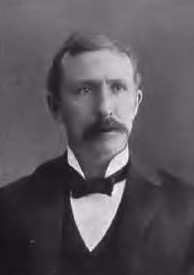 DEWITT,
Charles Herman, a well-known physician of Glenwood, is a
son of James A. Dewitt, a Methodist minister, who, after serving three years
as a private in the civil war, removed to Michigan from New York, and
there engaged in farming until his death in 1876. The family was a family
of ministers-three of Dr. Dewitt's father's brothers being of that calling.
One uncle -H. G. Dewitt, D. D.-was a prominent evangelist, holding
revivals in many of the important cities of the United States. His mother,
Phoebe Streator Dewitt, was a native of New York state, her
parents being farmers in Cayuga county. Her father served as a soldier in
the Mexican war. She
was noted for her charitable works and as a lady of culture and a devoted
Christian. Her family were strictly farmers, and being successful
financially, each one of the boys received a farm to begin life with. Mr.
Dewitt's father's family consisted of four children. DEWITT,
Charles Herman, a well-known physician of Glenwood, is a
son of James A. Dewitt, a Methodist minister, who, after serving three years
as a private in the civil war, removed to Michigan from New York, and
there engaged in farming until his death in 1876. The family was a family
of ministers-three of Dr. Dewitt's father's brothers being of that calling.
One uncle -H. G. Dewitt, D. D.-was a prominent evangelist, holding
revivals in many of the important cities of the United States. His mother,
Phoebe Streator Dewitt, was a native of New York state, her
parents being farmers in Cayuga county. Her father served as a soldier in
the Mexican war. She
was noted for her charitable works and as a lady of culture and a devoted
Christian. Her family were strictly farmers, and being successful
financially, each one of the boys received a farm to begin life with. Mr.
Dewitt's father's family consisted of four children.
Doctor
Dewitt was born in Auburn, N.
Y., January 2, 1859. He was educated in the common schools of
Michigan and Iowa and began teaching when only 16 years of age. For four
years he alternately taught and attended school, using the money earned
from teaching to assist him in his laudable efforts to secure an
education. In March, 1883, he graduated from the medical department of the
University of Illinois, at Chicago, and immediately located at Lucas,
Iowa, where he began general practice. He remained at Lucas until 1890,
when he removed to Glenwood, where he has since lived. The doctor has had
hospital training at Cook county hospital and taken post graduate courses
in the cities of Chicago and New York. He devotes special attention to
gynecology and surgery, in the practice of which he has become very
successful.
He is at
present chairman of the board of the United States pension examiners at
Glenwood, and was formerly surgeon for the Whitebreast Coal and Mining
company. He is a member of the Southwestern Iowa Medical society, Iowa
State Medical society and American Medical association. He is a member of
the Masonic fraternity, Royal Arch chapter, and Knight Templar commandery,
and also a member of the Knights of Pythias and A. O. U. W. lodges. Doctor
Dewitt has always been a republican, and cast his first vote for James A.
Garfield. He has never held or sought any political office and prefers to
devote his time and energies to his profession, in which he has attained a
high position as a practitioner.
He was married to
Miss Eleanor S. Shields, of Henry, III., November 9,1884. They have one
child, a son, born June 30, 1886. They have an ideal home in Glenwood, and
the doctor attributes much of his success to his wife and home
surroundings.
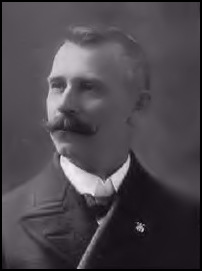 EVANS, Marion Le Grand, of Emerson, the well-known banker and
breeder of Aberdeen-Angus cattle, was born near Decorah, Henderson county,
111., June 30, 1858. His grandfather, John Evans, Sr., was born in
Maryland, April 9, 1794, and was descended from Welsh ancestors. John
Evans, Jr., the father of Marion L., was born in Crawford county, Ohio,
June 18, 1830, and moved with his parents to Henderson county, 111., in
1837. Starting in life without financial assistance he has by good
judgment and close attention to business accumulated a comfortable
fortune, and still resides in Henderson county. He was married April 23,
1857, to Sarah Young Davis, who was born in Ballston, Saratoga county, N.
Y., March 13, 1839, and came with her parents to Henderson county, 111.,
in 1836. Her father, Abner Davis, was born in Vermont, September 21, 1794,
and served through the war of 1812. In 1836 he settled upon a farm given
him by the government in Henderson county. III., where he continued to
reside until his death, December 10, 1874. EVANS, Marion Le Grand, of Emerson, the well-known banker and
breeder of Aberdeen-Angus cattle, was born near Decorah, Henderson county,
111., June 30, 1858. His grandfather, John Evans, Sr., was born in
Maryland, April 9, 1794, and was descended from Welsh ancestors. John
Evans, Jr., the father of Marion L., was born in Crawford county, Ohio,
June 18, 1830, and moved with his parents to Henderson county, 111., in
1837. Starting in life without financial assistance he has by good
judgment and close attention to business accumulated a comfortable
fortune, and still resides in Henderson county. He was married April 23,
1857, to Sarah Young Davis, who was born in Ballston, Saratoga county, N.
Y., March 13, 1839, and came with her parents to Henderson county, 111.,
in 1836. Her father, Abner Davis, was born in Vermont, September 21, 1794,
and served through the war of 1812. In 1836 he settled upon a farm given
him by the government in Henderson county. III., where he continued to
reside until his death, December 10, 1874.
Marion L.
Evans received his early education in the country schools and completed an
academic course. Later he attended Monmouth college. In the spring of 1879
he moved "out west," as people said, to Iowa, and located on a farm in
Mills county. In 1889 Mr. Evans removed to Emerson, where he built a home
and has since resided. Mr. Evans' experience in stock raising began when
he was a small boy and when he was 16 he was able to sell all the stock he
had raised for $1,200 which was used in paying his school expenses. For many years he has been
associated with his father in the live stock business, and they now own
7,300 acres of Iowa land and usually have on hand some 2,000 head of
cattle.
Mr. Evans is
president of the American Aberdeen-Angus Breeders' association, and has a
wide reputation as a careful and successful breeder of black cattle. He is
also president of the Farmers bank at Emerson, and a director of the First
National bank of Malvern. He is a republican and a member of the A. F. A.
M. Chapter, Commandery of Red Oak, and of Tangier Temple at Omaha,
Neb.
Mr. Evans
was married June 28, 1883, to Hattie M. Tubbs, daughter of Judge L. W. Tubbs. They have five children: Edith
L., born April 13, 1884; John L., born November 8, 1885; Frank N., born
May 11, 1888; Marion L., Jr., born December 27, 1891, and Volney, born
October 4, 1893.
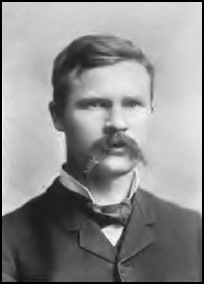 GILLILLAND, Shirley, was born in a log hut on the banks of the
Missouri river in Mills county, Iowa, forty-three years ago, of
Scotch-Irish parentage. He grew up on a farm in that neighborhood, with
limited school advantages to the age of 17. On the death
of his grandmother at that time, who left him $200, he started for Iowa
City and entered the old "sub-fresh " department of the university in
January, 1874, where he remained through the whole course, sawing wood
Saturdays, turning the old Republican press nights and working in
vacations to help pay expenses. He graduated in 1879 with commencement
honors. GILLILLAND, Shirley, was born in a log hut on the banks of the
Missouri river in Mills county, Iowa, forty-three years ago, of
Scotch-Irish parentage. He grew up on a farm in that neighborhood, with
limited school advantages to the age of 17. On the death
of his grandmother at that time, who left him $200, he started for Iowa
City and entered the old "sub-fresh " department of the university in
January, 1874, where he remained through the whole course, sawing wood
Saturdays, turning the old Republican press nights and working in
vacations to help pay expenses. He graduated in 1879 with commencement
honors.
In 1879-80
he engaged in newspaper work on the Iowa City Republican and Gate City.
His health failing under the strain of morning daily service, he spent the
next three years on the old home place in Mills county, farming in summer
and teaching in winter. In 1883-4 he returned to the university and took
the law course, graduating among the commencement eight in a class of one
hundred and three. In June, 1884, he formed a partnership with Hon. John
Y. Stone, at Glenwood, which continued until the latter became
attorney-general in 1889. In 1878 he was the annual commencement orator
for Irving society. In February, 1879, he was the salutatorian for the
annual program of this society. In 1884 was on the debate for annual
program of the same. In 1885 he was selected by the faculty of the law
department and the supreme court as a member of the examining board of the
law class of 1885 as the representative of the class of 1884. In 1894 he
was again selected as a member of the examining board, and in 1895 was
selected by the supreme court as member of a committee of three to examine
applicants for admission before that body. In 1891 he was elected by the
board of regents of the university as a member from the Ninth
congressional district to fill vacancy occasioned by the resignation of J.
J. McConnell. In 1892 he was elected by the legislature to a full term and
in 1898 re-elected. On this board he has been frank, direct and fearless,
having no patience with red tape or snobbery, and imbued with the one
purpose to give the university high rank. In 1892 he was elected county
attorney of Mills county, and was twice re-elected, declining to be a
candidate in 1898 in order to enter the contest for senator for the
Mills-Montgomery district. During his six years as a prosecutor for Mills
county he secured the conviction of 118 persons in the district court,
collected over $15,000 for the county, and in the whole period not a
dollar was paid by the county for assistant counsel. He has been one of
the active spirits in bringing Mills county into notice as a fruit region
and was the presiding officer at both the apple carnivals. He has been
president of the Old Settlers' association, comprising Fremont, Mills and
Montgomery counties. In politics, Mr. Gillilland is an ardent republican,
and was temporary chairman of the last congressional convention and in
religion he is an earnest Congregationalist, being honored by the Council
Bluffs association with election as its delegate to the national
association at Portland, Ore., in 1898. His family consists of a wife,
formerly Elsie Moulton, a son, Paul, aged 8, and a daughter, Grace, aged
6.
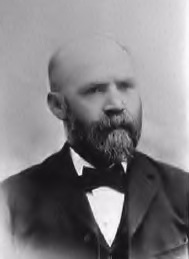 HEINSHEIMER, D. L. The Heinsheimer mercantile company of
Glenwood is well known throughout all southwestern Iowa. The head of that
firm is the subject of this sketch. He is widely known, not alone on
account of his connection therewith, but by reason of the interest he
takes in orcharding and the breeding of fine cattle. He is, in truth, a man who has amassed a fortune through close
application of his fine business talents to the management of his
mercantile business and in wise investments, and that wealth he has used
as becomes a good citizen, in advancing the various interests of his
community. HEINSHEIMER, D. L. The Heinsheimer mercantile company of
Glenwood is well known throughout all southwestern Iowa. The head of that
firm is the subject of this sketch. He is widely known, not alone on
account of his connection therewith, but by reason of the interest he
takes in orcharding and the breeding of fine cattle. He is, in truth, a man who has amassed a fortune through close
application of his fine business talents to the management of his
mercantile business and in wise investments, and that wealth he has used
as becomes a good citizen, in advancing the various interests of his
community.
He was born
in Eppingen, Baden, Germany, March 19, 1847. Although his parents died
while he was yet young, he was given a good education in the common
schools. He came to Iowa and to Glenwood in April, 1861, a poor boy, and
through his own efforts has become one of the leading citizens of that
section both as to wealth and influence. He began his business career as
clerk in a store and saved what he could from his small salary, which was
carefully invested as fast as earned. In 1872 he was in position to
purchase an interest with his employer, Mr. P. D. Foster, and the business was
conducted under the firm name of P. D. Foster & Co. until 1875, at which time he
engaged in business alone for three years, then a brother, Albert
Heinsheimer, was taken into partnership and the firm was known as D. L.
Heinsheimer & Co. until 1894.
He is at this time connected with several banks, and is president
of the Mills County National bank at Glenwood, is a large land holder and
owns one of the finest orchards in Mills county, in which he takes great
pride. He has given much attention to improving and raising the standard
of cattle and is the owner of Hugo Countess, the Jersey that made the
great record in the breed tests at the World's fair. The Iowa
commissioners voted and paid to him $250 for the excellent showing made by
this cow.
His varied
interests becoming a tax upon his time he, in 1894, concluded to take into
business with him another partner, and accordingly in that year was
incorporated the D. L. Heinsheimer Company, of which this subject was made
president, E. R. Heinsheimer, secretary, and Albert Heinsheimer,
treasurer. E. R. Heinsheimer, the secretary, is a son of the head of the
corporation and a young man of fine business ability. This company is
still existing.
Mr.
Heinsheimer is a republican. He has held local positions of trust since
becoming a voter, has served as member of the city council and was elected
to the honorable position of mayor. He was a member of the school board
for eighteen years, twelve of which he served as its president. He was a
delegate to the national republican convention in 1892, and was the Iowa
member of the committee on rules and organization. Was elected
presidential elector for Iowa in 1896. He was married to Miss Sarah Pettinger, September 20, 1870. They
have been blessed with six children, five of whom are now living. They are
named respectively, Carrie (now Mrs. B. Shoninger of Chicago), Edward,
Jeannette, Lester and Theresa.
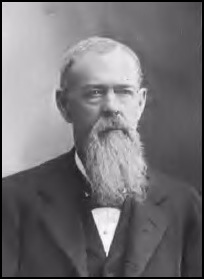 HINCHMAN, Joseph V., the leading banker of Glenwood, Mills
county, was born May 13, 1831, in Rush county, Ind. He comes of English ancestry on
his father's side and English and Irish on his mother's side. The father
was James Hinchman, born in Monroe county, Va., in 1800, and settled in
Rush county, Ind., in 1822, where he lived until his death, in August,
1882. He was a farmer, who was successful in life, and with his wife
brought up thirteen children-ten boys and three girls. His wife was Nancy
Nickel, born in 1804 and died March 18,1897, aged 92 years and 6 months.
She had lived and kept house on the same farm seventy-four years. At a family
reunion, held at the old family homestead, September 4, 1880, the parents
and children were all present, the children all being heads of families;
sixty-seven children and grandchildren were present, and neighbors and
friends to the number of 400. HINCHMAN, Joseph V., the leading banker of Glenwood, Mills
county, was born May 13, 1831, in Rush county, Ind. He comes of English ancestry on
his father's side and English and Irish on his mother's side. The father
was James Hinchman, born in Monroe county, Va., in 1800, and settled in
Rush county, Ind., in 1822, where he lived until his death, in August,
1882. He was a farmer, who was successful in life, and with his wife
brought up thirteen children-ten boys and three girls. His wife was Nancy
Nickel, born in 1804 and died March 18,1897, aged 92 years and 6 months.
She had lived and kept house on the same farm seventy-four years. At a family
reunion, held at the old family homestead, September 4, 1880, the parents
and children were all present, the children all being heads of families;
sixty-seven children and grandchildren were present, and neighbors and
friends to the number of 400.
Joseph V.
Hinchman lived on the farm until he was 21 years old, and received a
common school education. He had no professional or business training until
he went into business for himself. Teaching school at $20 a month, and
boarding himself, was his first employment after leaving the farm. He came
to Glenwood October 13, 1854, and opened the first drug store in the
county, a business which he carried on for twenty-five years, and sold out
in 1879. This was his first
business venture, and it was started at a time when $1.50 to $2 a day was
a very satisfactory profit for the store.
In 1869 he
started a private bank in connection with the store, but sold it out in
1871, and helped organize the Mills County National bank, of which he was
that year elected president, an office which he held for ten years. In
1882 he sold his interest in the National bank and established the Bank of
J. V. Hinchman in Glenwood, of which he is still the proprietor. Here is a
case where success has been achieved by steady, hard work and economy, and
without any element of speculation. He started with a capital of $1,500, a
portion of which was used in entering land in Polk and Mills counties, the
remainder employed in his drug store. This has grown until now Mr.
Hinchman is rated at $300,000 above all debts. He never mortgaged a piece
of property in his life. While accumulating this fortune he has been
generous and has, within the past six years, given away to various
churches and colleges $30,000; $25-000 to Des Moines college - the Baptist
institution. Mr. Hinchman's has been a purely business life. He has
devoted himself with remarkable singleness of purpose to achieving success
in a financial way, and by honest dealing, promptness in meeting
obligations, economy and industry, and attention to details, small as well
as large, he has achieved great success. Like many other strong,
successful men, he has no partners and no low-priced clerks or
employees. He was a member of
the whig party, and has always been a republican. As his generous gift
indicates, he belongs to the Baptist church, and has for thirty-three
years.
Mr. Hinchman was married to Nancy L.
Fish in Moundsville, Va., September 27, 1859. They have had
only one child, who died in infancy. Mrs. Hinchman was born November 13,
1833, and is still living.
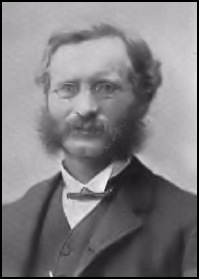 HUFFAKER, Henry Harrison, of Silver City, Mills county, a
highly successful farmer and stock raiser, is one of the most prominent
agriculturists in south-western Iowa. He was born and raised on a farm and
from early boyhood was ambitious to follow the independent life of a
farmer, and become the owner of broad acres, well stocked and well
cultivated. HUFFAKER, Henry Harrison, of Silver City, Mills county, a
highly successful farmer and stock raiser, is one of the most prominent
agriculturists in south-western Iowa. He was born and raised on a farm and
from early boyhood was ambitious to follow the independent life of a
farmer, and become the owner of broad acres, well stocked and well
cultivated.
Mr.
Huffaker's father, Israel Huffaker, was the fourth child of John and
Priscilla Huffaker, and was born June 9, 1814, in Wayne county, Ky. At the
age of 14 years he left his home and, accompanied by his brother Jacob,
walked to Morgan county, 111. Two years later he enlisted in the army for
service in the Black Hawk war, serving during the years 1831 and
1832. After his discharge he
returned to Jacksonville and on May 1, 1834, married Ann Maria Kurtz. They
resided in Morgan county until 1840, when they removed to Bureau county,
111., and were engaged in farming until 1854. In that year they removed to
Hancock county, where they re-sided two years, returning to Bureau county
in 1856. They lived there for thirty-four years, or until 1890, at which
time they removed to Mills county, Iowa, where their son Henry had
preceded them a number of years. Israel Huffaker was a zealous Christian
man, having, in his early boyhood days, united with the Christian church,
remaining a member until 1841, when he united with the Church of Christ,
and was ordained as a bishop in 1844; later he was designated as one in
the lineage of Levi, and was ever an energetic worker for his Lord and
Master. In his occupation of farming he was very successful financially,
and accumulated over 2,000 acres of land. He died December 20, 1896. Henry Huffaker's mother was born
near Samuel's Depot, Nelson county, Ky., March 9,1819, and was the
youngest daughter of John and Margaret Kurtz. She was a devoted worker in
the Christian church for over half a century, ready at all times to lend a
helping hand to the needy and unfortunate. She died August 20, 1895.
H. H.
Huffaker was born January 24, 1841, in Bureau county, 111., near
Dover. He attended the
district school and Dover academy, completing his education at the
Princeton, 111., high school. In 1868 he came west and settled in Mills
county, Iowa, his present home. At that time the country was in its wild
state, the settlers being few and far between. His farm at first consisted
of about 300 acres, and it was later upon this tract of land that the
foundation of Silver City was laid, after securing from the Wabash, St.
Louis & Pacific railroad the location of a station there. The embryo
town of 1879 has grown until at the present time it numbers about 700
people. Mr. Huffaker has increased his landed possessions until he now
owns 1,500 acres which is well improved and well supplied with stock. He
does not buy largely of stock but raises nearly all that he feeds, having
constantly in pasture from to 200 to 300 head.
Mr. Huffaker
has held a number of offices of public trust and is a member of several
agricultural societies. A share of his ample means is ever ready to be
used to advance the cause of education. He is also a liberal giver for the
aid of church work and ever willing, like his father,, to respond to his
Master's will. Was ordained a minister of the gospel January 8, 1872. He
was married to Miss Mary J Post, daughter of Stephen and Jane Post, a
native of Pennsylvania, December 11, 1872, in Marion county, Iowa. They
have one daughter by adoption, Birdie Almaretta
Huffaker.
Father Post
was a minister of the gospel fifty-three years before his decease. Both
were born in the state of New York.
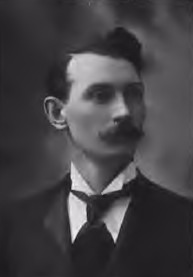 MARSH, Oscar Hamdon, of Glenwood, is the superintendent of the
public schools of Mills county. He is one of the scholarly men of Iowa and
has devoted himself with enthusiasm to his chosen work of instructing the
young. Mr. Marsh was born near Williamsport, Penn., July 23, 1864, and is
of notable ancestry on both father and mother's
side. MARSH, Oscar Hamdon, of Glenwood, is the superintendent of the
public schools of Mills county. He is one of the scholarly men of Iowa and
has devoted himself with enthusiasm to his chosen work of instructing the
young. Mr. Marsh was born near Williamsport, Penn., July 23, 1864, and is
of notable ancestry on both father and mother's
side.
His father
was of English extraction, his ancestors coming to America in 1750,
settling near Munice, Lycoming county, Penn. They were of patriotic mould
and many of them took arms in defense of liberty during the war with Great
Britain. They were also concerned in the military movements of the Wyoming
Valley and New York against the Indians. One branch of the family located
at Lewisburg, Penn., and one of them Invented and manufactured the once
famous "Marsh Harvester." His grandfather located near Williamsport,
Penn., where he was a man of wealth and prominence. During the civil war
many of family took part in the battles in which the army of the Potomac
was engaged, and two cousins met their death by starvation in
Andersonville prison. On his
mother's side, the family were of German descent, and early in the
colonial period settled in Snyder county, Penn. His mother was a
grand-daughter of the famous Simon Snyder, who was for several terms a
state senator and later the governor of Pennsylvania. His mother's father,
Elijah Couldren, was a merchant of Selin's Grove, and did a prosperous
business in the days of packet transportation. He had two children, Mr.
Marsh's mother and a son who served throughout the civil war. Mr. Marsh's
father, George W. Marsh, is a resident of Selin's Grove, Penn., and is
engaged in fruit raising and farming.
He was
educated at Susquehanna university at Selin's Grove. He taught school
while a young man and was recognized as one of the ablest educators in the
state. Mr. Marsh began his
education in the district schools. His father's interest in his education
induced him to study and read a great deal at home, and at the age of 15
he was far advanced for his years and was sent to the preparatory
department of Susquehanna university, where he remained four years. In
this school he took the full classical course and was a proficient Latin,
Greek and German scholar. He also became a diligent student of history and
literature. He was an active member of the Philosophian Literary society,
and was editor of its literary journal for four consecutive terms. He was
chosen several times to represent the society in public exercises, and was
its president two terms. He
graduated from Susquehanna university with honors in 1882. The following
year he entered the junior class of Pennsylvania college, at Gettysburg,
where he ranked high in his class. He here took a classical course and
paid special attention to history and literature. He was a prominent
member of the Phrenakosmian literary society. He was also a member of Beta
chapter of the Phi Delta Theta society. He graduated in June, 1894, taking
the degree of A. B. and one
year later the degree of A. M.
In August,
1887, Mr. Marsh came to Iowa as principal of the Oakland schools. He had
previously taught in Winfield, Union county, Penn., for two years,
employing his spare time in reading law in the office of Charles P. Ulrich
of Selin's Grove. In 1886 he was admitted to the bar, but after a
successful year of practice he returned to his first loved work, that of
instructor and educator. He
remained as principal of Oakland schools four years and his efforts were
well appreciated by patrons. Following this work he had charge of the
Henderson schools two years and the Emerson schools three years, meeting
with fine success in both places. For ten years Mr. Marsh has been
considered one of the best educators in the west in normal institute work
and his services have been constantly in demand. His special subjects are history
and literature. He has written a text-book entitled "Aids and Methods in
United States History," to be published this year. He holds state
certificates and life diplomas from Pennsylvania and Iowa, and was made a
member of the educational council at the Iowa State Teachers' association
in 1898. In Mills county Professor Marsh is regarded as efficient and of
superior ability. He is a
popular man both in and out of school work and makes a host of friends
wherever he goes.
Mr. Marsh is
a democrat and was nominated in Pottawattamie county for auditor in 1893.
He was a delegate to the state democratic convention which nominated
Governor Boies the second time. He was also a delegate to the state
democratic convention in 1892. He was a member of the county central
committee of Pottawattamie county and was assessor of Oakland two years.
His present office was tendered him by the democrats of Mills county in
1897. They gave him the
largest democratic majority since the organization of the
county.
Mr. Marsh earned
his first money as a field hand in the harvest time. He is a Lutheran in
religious belief. He is a member of the Iowa State Teachers' association,
also a Past Chancellor in the Knights of Pythias order and was a delegate
to the grand lodge in 1894. He was married September 4, 1888, to Miss
Stella G. Bebee, of Corry, Penn.
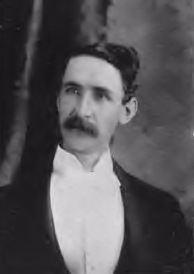 PATRICK, Oscar Rudd, of Glenwood, is a member of the firm of
Winkler & Patrick, and is a bright young lawyer with the best of
prospects before him for a busy professional life. His ancestors were
strict Scotch Presbyterians. His grandfather, Alexander Patrick, came from
Scotland in 1827 and established a woolen factory in South Granville, N.
Y. His father, Robert Patrick, was born in Glasgow, Scotland, October 12,
1823, and when 4 years old came to America with his parents. He farmed
successfully for many years, but is now retired and lives at Emerson,
Iowa. He is in comfortable
circumstances, owning a 240 acre farm a mile from the town. Mr. Patrick's mother was Mary
McDonald, who was born September 4, 1825, and died February, 1894. Her
ancestors were also from Scotland, and came to this country as members of
the Scotch Highland troops. They were filled with a spirit of liberty, and
deserted his majesty's service to join the American
revolutionists. PATRICK, Oscar Rudd, of Glenwood, is a member of the firm of
Winkler & Patrick, and is a bright young lawyer with the best of
prospects before him for a busy professional life. His ancestors were
strict Scotch Presbyterians. His grandfather, Alexander Patrick, came from
Scotland in 1827 and established a woolen factory in South Granville, N.
Y. His father, Robert Patrick, was born in Glasgow, Scotland, October 12,
1823, and when 4 years old came to America with his parents. He farmed
successfully for many years, but is now retired and lives at Emerson,
Iowa. He is in comfortable
circumstances, owning a 240 acre farm a mile from the town. Mr. Patrick's mother was Mary
McDonald, who was born September 4, 1825, and died February, 1894. Her
ancestors were also from Scotland, and came to this country as members of
the Scotch Highland troops. They were filled with a spirit of liberty, and
deserted his majesty's service to join the American
revolutionists.
O. R.
Patrick was born October 13,1864, near Blue Island, Cook county, 111., but
soon afterward his parents moved to Iroquois county. Here he attended
district school, and his education was continued in the graded schools of
Emerson, Mills county, Iowa. He was always a bright pupil, and the first
money he ever earned was received in the shape of a prize awarded him for
excellence in spelling, when he was only 7 years old. During his last year
in the public school his ambition for a university training was aroused by
George W. Goodsoe, a graduate of Dartmouth college, who was then principal
of the schools at Emerson Mr. Patrick entered the preparatory department
of Parsons college, at Fairfield, March, 23, 1886, graduating the
following June. The next September he began regular college work, and in
June, 1890, graduated from the classical course. While in college he took
particular delight in the study of literature, history and mathematics,
and excelled in composition and oratory. During his junior year he won
first place in the home oratorical contest, and this victory entitled him
to represent the college at the state oratorical contest, which occurred
in March, 1889, at Cornell college, Mount Vernon. Here he succeeded in
again winning first honors, though he had the best orators from all the
leading colleges of the state with whom to compete. While at school he was
a member of the Orio Literary society, and was prominent in all college
activities. The first year
after graduation was spent in Emerson, Iowa. In November, 1891, he was
elected county superintendent of schools in Mills county, and held this
office until January 1, 1896. Though devoted to his educational work he
managed to find time for the study of law while holding this position. He
entered the office of Hon. Shirley Gilliland, at Glenwood, in 1892, and by
earnest study under this able and generous man he was prepared for the
state examinations and was admitted to the bar in the supreme court of
Iowa, January, 1896, at Des Moines. Since then he has practiced law at
Glenwood in partnership with A. H. Winkler, a real estate man of wide
experience, who has greatly aided Mr. Patrick in getting a start in the
profession. In addition to legal business the firm loans money, deals in
real estate and does some insuring.
Born in the
north in war time, Mr.
Patrick was taught very young to admire Lincoln and other great
republican leaders, and he has always stood by the party which they served
so well. The superintendence is the only office which he has held. He is
an Odd Fellow and a Free Mason. In religion he is a Presbyterian, but at
present holds his membership with the Congregational church, there being
no denomination of his choice in Glenwood. He belonged to the state militia
under Governor Jackson's administration, and assisted in expelling Kelly's
army, acting as first lieutenant of Company G, Third regiment of the I. N.
G.
Mr. Patrick was married June 25, 1893, to Miss
Bertha E. Tubbs, the youngest daughter of Judge L. W. Tubbs, of Emerson,
and to her counsel and cheer he attributes a large part of his success.
They have no children.
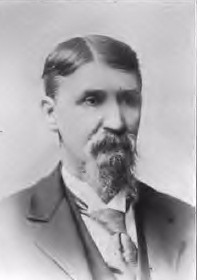 POWELL, Dr. Francis Marion, is the well known superintendent of
the Iowa Institution for Feeble-Minded Children, at Glenwood, a position
he has held with increasing usefulness, to the appreciation of the people,
for more than fifteen years.
The right sort of training was given young Powell, amid the trying
surroundings of a pioneer life, to fit him as an important factor in state
building, in the development of Iowa's possibilities. Born in Morgan county, Ohio,
November 12, 1848, the second child in a family of seven, his parents
William and Melissa (Williams) Powell, removed in 1857, to Badax, now
Vernon county, Wis. The father was a pioneer teacher and minister, and
came of Welsh stock; the mother was of English ancestry. POWELL, Dr. Francis Marion, is the well known superintendent of
the Iowa Institution for Feeble-Minded Children, at Glenwood, a position
he has held with increasing usefulness, to the appreciation of the people,
for more than fifteen years.
The right sort of training was given young Powell, amid the trying
surroundings of a pioneer life, to fit him as an important factor in state
building, in the development of Iowa's possibilities. Born in Morgan county, Ohio,
November 12, 1848, the second child in a family of seven, his parents
William and Melissa (Williams) Powell, removed in 1857, to Badax, now
Vernon county, Wis. The father was a pioneer teacher and minister, and
came of Welsh stock; the mother was of English ancestry.
Ten years of
life in a new country gave the young man a training that has served him
well in after life, inculcating in him habits of industry, frugality,
economy, honesty, and a perseverance which have carried him to
success. He attended the
primitive schools in log cabins in winter time and by his own efforts
earned means to attend select schools, working for board and tuition,
finally becoming a teacher himself, his purpose being to study medicine.
With his own earnings he returned to Ohio and attended the Ohio Wesleyan
university, at Delaware. After this he taught school for a time, keeping
the medical profession constantly in view, and at length graduated from
the Starling Medical college, Columbus, Ohio, in February, 1875, with or
pupils. No criticism has ever been made of Dr. Powell's work; instead it
has been highly praised, and he has become a recognized authority on the
care and management of persons affected with mental weakness. Having a
warm, sympathetic nature, and being ably assisted by his faithful wife as
matron, Dr. Powell has been singularly successful in the development of
the unfortunates placed under his care. The business of the institution
has been well looked after, too, and the appropriations of the legislature
were made to go as far as possible. The institution suffered a severe loss
from fire by lightning in August, 1896, and the skill and resources of the
superintendent were heavily taxed in this trying emergency, and he was not
found wanting.
But Dr.
Powell is not a one-sided man, for he has earned distinction as a
horticulturist, outside his profession. He is serving his second term as
president of the State Horticultural society, and has been a regular
attendant upon horticultural meetings in the state for many years. He was
one of the first to realize the possibilities of the wonderful apple belt
of southwestern Iowa and to take advantage of the opportunity. He has been
a hard working horticulturist ever since he settled in that part of the
state, and has won distinction in the business. He owns two orchards of
3,000 and 6,000 trees, near Glenwood, and numerous smaller ones, besides
having started and sold several fruit farms. Through his
energy in this direction, the state owns one of the most valuable orchards
in Iowa. Dr. Powell was active in organizing the Mills County Fruit
carnival at Glenwood, in 1895, which has now become an annual feature of
the great apple harvest in southwestern Iowa. He has always been a
republican, but has held no elective office besides being a member of the
school board. He is a member of the State Medical society, and an active
member of the National Conference of Charities and Corrections. Dr. Powell
was married in 1870, to Louisa M. Newton, and they have four children: Ida
M., Velura, Orrin W., and Fred M. The oldest daughter, Ida M., is married
to Elmer E. Black and lives in Chicago.
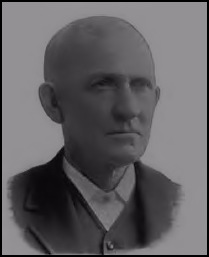 STRAHAN, James Miller, a well-known banker of Malvern, was born
in Putnam county, Ind., November 17, 1829. His father, James Strahan, and
his mother, Elizabeth Ramsey Strahan, were of Scotch-Irish descent. They
started in life with little besides industry for capital, working at
farming. The father died when James was a small boy. STRAHAN, James Miller, a well-known banker of Malvern, was born
in Putnam county, Ind., November 17, 1829. His father, James Strahan, and
his mother, Elizabeth Ramsey Strahan, were of Scotch-Irish descent. They
started in life with little besides industry for capital, working at
farming. The father died when James was a small boy.
In August,
1836, the family moved to Henderson county, 111., where James worked on a
farm and at any kind of labor at which he could help to make a living.
When the great gold discoveries were made in California in 1848, young
Strahan at once set to work to raise the means to try his fortune at gold
mining. In the spring of 1850 he found a chance to make the long, slow,
overland journey to the gold regions. He followed mining for three years
and accumulated enough of the metal to return to Illinois and buying a
drove of cattle, which he drove across the plains and mountain ranges to
the Sacramento valley, arriving there in 1854. In the spring of 1855 he
returned to the states, stopping for a time in Marion county, Iowa. In the
winter he returned to his old home in Henderson county, 111., and January
3, 1856, was united in marriage to Miss Frances C. Davis. They settled in Marion
county on a farm, where they remained many years. Mr. Strahan was a successful
farmer, buying, feeding and selling stock. In 1870 they moved to Mills
county, near Malvern, where Mr. Strahan, in company with John Evans,
bought large tracts of land, improving and selling farms, and dealing in
and feeding cattle and other stock. In 1873 Mr. Strahan, with others, laid
out that part of Malvern known as Strahan's addition.
In 1875 he
was one of the men who established the First National bank of Malvern, of
which he was elected president, and still holds that position. He is also
president of the private banking house of Strahan & Christy in the
same town. He is also
president of the First National bank of Wayne, Neb. In 1879 he narrowly
escaped death in a terrible railroad accident. He was shipping, with
others, eighteen cars of stock to St. Louis, and with six other men was in
the caboose as the train was crossing the Missouri river on the high
bridge at St. Charles. Hearing a frightful noise, Mr. Strahan sprang to
the door and saw that a span of 300 feet of the great bridge had fallen,
as the engine and one car had gone over. With great presence of mind he
jumped for the ties when the car was within twenty feet of the terrible
abyss. An instant later the car went down carrying his six companions into
the river. But one of them escaped instant death.
Five
children were born to Mr. and Mrs. Strahan, two sons and three
daughters. The oldest son,
Frank, is vice-president of the First National bank of Wayne, Neb., and
the other, Otis, is assistant cashier of the First National bank of
Malvern. August 30, 1885, Mrs. Strahan, who had been in poor health for
several years, died. In 1889 Mr. Strahan was married to Mrs. Mary Wheeler Gailford. Both are
members of the First Baptist church of Malvern. Mr. Strahan's daughters, Lucia, Ella and
Rossetta, are married and settled at Wayne, Neb.
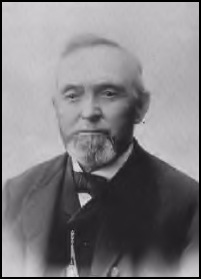 TUBBS, Hon. L. W., of Emerson, has the distinction of having
been a member of the first legislature of California after its admission
to the union of states. He was born in Binghamton, N. Y., January 4, 1826,
and at 12 years of age removed with his parents to the Western Reserve in
Ohio. Later he was placed in Oberlin college, but owing to losses
sustained by his father in road building, was compelled to give up his
college course, in which he was making rapid progress, particularly in the
studies of surveying and engineering. He went from school to Sandusky
City, where he learned the miller's trade, and at the age of 19 years
removed to Michigan. Here he
earned the first money he could really call his own, helping to survey a
railroad from Detroit to Ypsilanti, now a part of the Michigan Central
system, March 1, 1849, he started across the plains with an ox train, of
which he was chosen the captain. They were on the road almost six months
before Long's Barr, on the Feather river, was reached. Here he tried
mining, but made only enough out of it to board and clothe himself. TUBBS, Hon. L. W., of Emerson, has the distinction of having
been a member of the first legislature of California after its admission
to the union of states. He was born in Binghamton, N. Y., January 4, 1826,
and at 12 years of age removed with his parents to the Western Reserve in
Ohio. Later he was placed in Oberlin college, but owing to losses
sustained by his father in road building, was compelled to give up his
college course, in which he was making rapid progress, particularly in the
studies of surveying and engineering. He went from school to Sandusky
City, where he learned the miller's trade, and at the age of 19 years
removed to Michigan. Here he
earned the first money he could really call his own, helping to survey a
railroad from Detroit to Ypsilanti, now a part of the Michigan Central
system, March 1, 1849, he started across the plains with an ox train, of
which he was chosen the captain. They were on the road almost six months
before Long's Barr, on the Feather river, was reached. Here he tried
mining, but made only enough out of it to board and clothe himself.
By an extra
session of congress, California was admitted to statehood in September,
1850, and he was elected to the legislature from that district. His term
ended, he returned to Long's Barr and engaged in the mercantile and mining
business, in the first of which he was highly successful. His health
failed, and the physician ordered a sea voyage, so he sailed for Honolulu,
where he remained about three months, and then went to Chili and remained
for some time, finally returning to his home in California to find that
his partner had sold out the business and skipped the country. He returned
to Flowerfield, Mich., after an absence of four years, and again took up
his old trade of milling. Here he was married, October 1, 1853, to Miss
Sibyl J. Wheeler, daughter of
Hon. William Wheeler, and remained until 1854, when failing health again
compelled a change of climate. Iowa was decided upon, and, though several
trips were subsequently made to Michigan, this state has ever since been
his home. He has been a resident of Mills county for nearly forty-one
years, and all his children but one have been born there. He has six
children living, three boys and three girls, the oldest son, W. L., born
in Michigan in 1855, being the present sheriff of Mills county.
He was
elected probate judge of Mills county in 1858 and held the office until
the law was changed - the first republican elected to the position in the
county. In May, 1861, he received an order from Governor Kirkwood to raise
a company of mounted minute men, and with the order was the request that
no man should be selected or permitted to join who for any reason would
not be able to go to war.
Within four days fifty-two men were enlisted, and in the election
which was insisted upon by Mr Tubbs, that gentleman was unanimously chosen
captain. He received his commission June 8, and the organization was kept
up to the close of the war. A second communication from the governor in
October, 1861, ordered him to recruit a regiment of all the men in the
county, exception being made to those enlisted in the mounted force, which
was done. An election was called to choose a colonel, and, as before, Mr.
Tubbs received all the votes. This last company was never called out, the
minute force being ample to keep back the Missouri raiders. Strange to say these men have not
yet been mustered out.
In politics
he is, and has always been, a republican, as are all his boys. He has been
a member of the Masonic order for almost fifty years, and has filled
nearly every office in the organization.
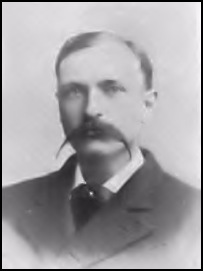 WHITNALL, William Rolfe. a prominent physician and surgeon of Hastings,
was torn in Milwaukee, Wis , March 23, 1852. His father William
Whitnall, a florist by trade, settled in Milwaukee in 1844. He is a
self-educated and thoroughly-informed man, deeply interested in all
current topics and the deeper philosophic and scientific questions that
underlie them. He is a man
who attracts people to him in all grades of society, and has a host of
friends wherever he has lived. He is an active worker in the Unitarian
church. His mother, Lucy
Crosby Rolfe Whitnall, was a native of New Hampshire, and a woman of
unusual literary ability and force of character. She was a graduate of
Hillsboro seminary. She taught school in Georgia, also in Milwaukee, Wis.
She was for many years a valued contributor to the Chicago Inter Ocean and
local newspapers of southern Wisconsin. Dr. Whitnall's family on his
father's side, is traced back to 1600, his ancestors being merchants and
farmers. His mother was descended from John Rolfe, one of the heroes of
early American history. WHITNALL, William Rolfe. a prominent physician and surgeon of Hastings,
was torn in Milwaukee, Wis , March 23, 1852. His father William
Whitnall, a florist by trade, settled in Milwaukee in 1844. He is a
self-educated and thoroughly-informed man, deeply interested in all
current topics and the deeper philosophic and scientific questions that
underlie them. He is a man
who attracts people to him in all grades of society, and has a host of
friends wherever he has lived. He is an active worker in the Unitarian
church. His mother, Lucy
Crosby Rolfe Whitnall, was a native of New Hampshire, and a woman of
unusual literary ability and force of character. She was a graduate of
Hillsboro seminary. She taught school in Georgia, also in Milwaukee, Wis.
She was for many years a valued contributor to the Chicago Inter Ocean and
local newspapers of southern Wisconsin. Dr. Whitnall's family on his
father's side, is traced back to 1600, his ancestors being merchants and
farmers. His mother was descended from John Rolfe, one of the heroes of
early American history.
Dr.
Whitnall's early education was received from private instructors, and
afterwards at Janesville, Wis., in the public schools. While a student in
the high school he devoted much of his time to music and painting. He
prepared for Michigan university at Milton college, Wisconsin, and in 1872
took the university work of the freshman year. He then taught school six
years in southern Wisconsin, after which he spent a part of two terms in
the State normal at Whitewater, Wis. He was a very successful teacher, his
specialties being mathematics and the sciences. But, not desiring to make
a life work of teaching, he took up the study of medicine with Dr. J. W.
St. John, of Janesville. After a year with him he entered the College of
Physicians and Surgeons in Chicago, completing his course in 1884. His
first location was at Alton, Kan., where he practiced in his profession
for two years. In 1886 he returned to Chicago to practice, also to perfect
himself in the polyclinics and hospitals of that city. He built up a good practice during
his six years' stay in Chicago, but was finally compelled to leave there
on account of his wife's health, removing to his present home-Hastings,
Mills county, Iowa. Following his father's faith, he is a Unitarian. He has always been a republican.
He was coroner of Mills county from 1895 to 1899. At the beginning of McKinley's
administration he was appointed examining surgeon of the United States
Pension board at Glenwood. He has been an active member of the Knights of
Pythias Lodge since 1884. He
is an Odd Fellow and organized the Lake View Lodge No. 10, of Chicago. For
this lodge he was the representative in the grand lodge for two years. He
is also a member of Humanity Lodge No. 378, A. F. & A. M., and Mt. Gerizim
No. 59, R. A. M.; also of the
Chicago Medical society, and Southwestern Iowa Medical society.
He was
married in 1885 at Alton, Kan., to Miss Minnie Cox, a woman of rare
intelligence and culture, who was educated at Tabor college. They have
four children: Rolfe Morse, born at Alton, Kan., in 1886; William Cox,
born in Chicago in 1888; Minnie Louise, born in 1892, and Helen Lucy, born
at Hastings in 1894.
Dr. Whitnall
is well known among his wide circle of friends and acquaintances as a
broad-minded, progressive man. His advanced views in surgery, and upon
many important questions pertaining to medicine, have attracted wide
attention and he has been requested to give them wider publicity through
the columns of medical journals.
He is a practical electrician and has connected the surrounding
country with his residence. Much of the necessary apparatus was
manufactured by himself, many of the lines being barbed wire
fences.
The information on Trails to the Past ©
Copyright may be used in personal family history research, with source citation. The pages in entirety may not be duplicated for publication in any fashion without the permission of the owner. Commercial use of any material on this site is not permitted. Please respect the wishes of those who have contributed their time and efforts to make this free site possible.~Thank you! |